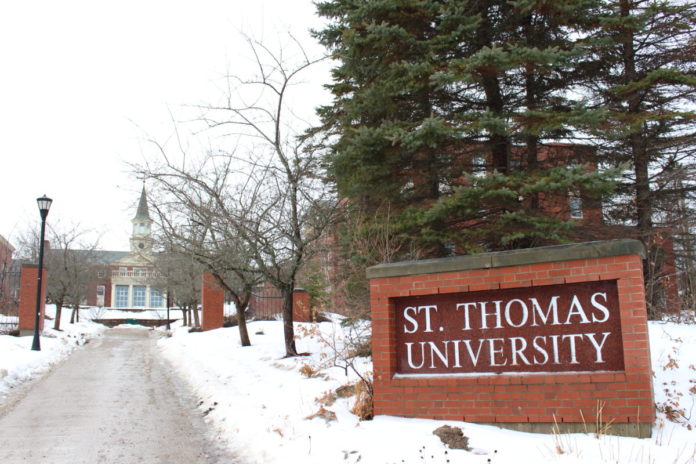A free and open press is one of the crucial bedrocks of a democratic society. The responsibility of journalists is to hold people to account, regardless of whether they are politicians, activists or even health experts.
It is a fact that the administration of St. Thomas University probably acknowledges but fails to fully embrace.
On Feb. 11, 2021, STU blocked The Aquinian out of reporting on the contents of the president’s report during the university’s monthly Senate meetings.
It followed the publication of Senate Briefs in which then-President and Vice-Chancellor Dawn Russell criticized Trevor Holder, New Brunswick’s minister of post-secondary education, for his “slanderous comments” about STU’s social work program.
Jeffrey Carleton, STU’s vice president of communications, told The Aquinian at the time that there were “some concerns,” dating back to 2020, about Senate meetings being “open to the public or the community.”
But Aquinian staff know the real reason; Russell said something in the heat of the moment, published for the community to see.
And nobody enjoys getting bad press.
Instead, the president delivers her report during in-camera sessions, meaning in private and confidential, at the end of meetings and asks anyone who isn’t a member of Senate to leave. What Senate is doing is a complete misuse of in-camera sessions.
The University of Saskatchewan’s board of governors defines one of the main proposes of in-camera sessions as an “opportunity for the board to discuss particularly sensitive matters,” such as litigation, labour relations or management performance.
There has to be a legitimate reason to go in-camera, but STU fails to provide one.
Senators have a duty to attend Senate and report back to faculty members about what was said. But are Senators now sworn to secrecy about the president’s report? Does that mean faculty members don’t know its contents? If they do, are they also sworn to secrecy?
This is not a logical use of in-camera sessions; it is a strict exclusion of the press.
The Aquinian began covering Senate in 2016 and has since been the subject of unfair and, at times, unprofessional treatment by the university. Sideways glances, motions to stop reporters from recording and now being asked to leave during a crucial part of Senate.
If you visit the City of Fredericton’s website, you can find a free live stream of council meetings and copies of that week’s agenda, circulating reports or motions tabled each week.
STU doesn’t even provide The Aquinian with that. And sadly, that’s nothing new to us.
How are students supposed to feel confident that their university is making appropriate decisions when Senators won’t even allow the student press to hear or accurately report about them?
STU’s website describes the value of a liberal arts education as exploring “controversial and competing ideas in ways that demand informed, careful and considered judgement.”
It even goes as far as calling a liberal arts education valuable because “a democratic society needs citizens who can think for themselves and can participate in the improvement of that society.”
I can’t deny the importance of the education provided by institutions like STU, especially in an era when misinformation runs wild and trust in the media, government and health care seems at times nonexistent.
So why has the university made this decision that essentially contradicts those values?
I call on Kim Fenwick, STU’s acting president and vice-chancellor, to reverse this decision and give the student press the ability to accurately report on the entirety of university Senate meetings.
Echoing my thoughts and those of past Aquinian EIC Sarah Morin, it’s not okay to stop the student press from reporting on critical university affairs.
We are students. We are journalists. We are student journalists. And we’re not going away.

